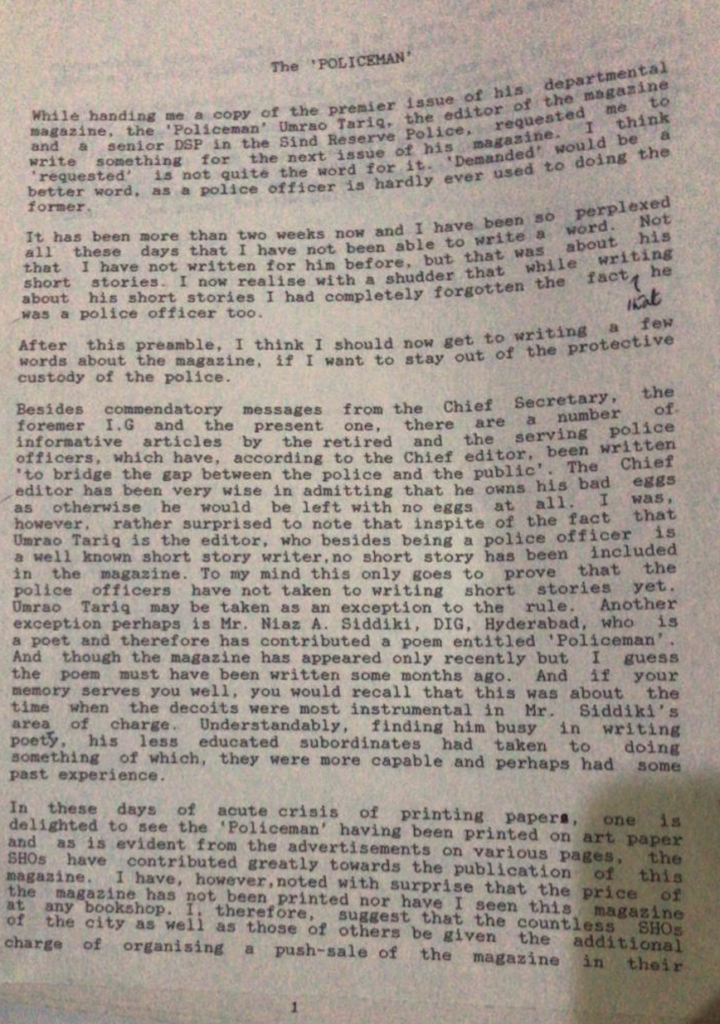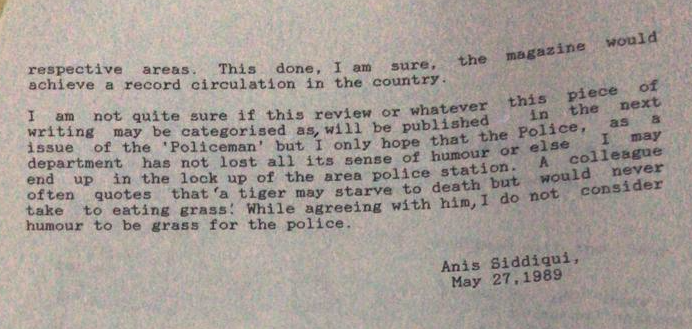The “Policeman” — by Anis Siddiqui
In 1989, my late father, Anis Siddiqui, wrote this article for a magazine at the behest of a literary and personal friend of his. I’m reproducing it here with minimal editing: the only changes are replacing single-quotes with double quotes and adding “sic” to a place where I believe he meant to use the word “titled” instead of “entitled”. In particular, the spellings of words follow the British norm and not the American standard that I — and my spell-checker — prefer.
The “Policeman”
While handing me a copy of the premier issue of his departmental magazine, the “Policeman” Umrao Tariq, the editor of the magazine and a senior DSP in the Sind Reserve Police, requested me to write something for the next issue of his magazine. I think “requested” is not quite the word for it. “Demanded” would be a better word, as a police officer is hardly ever used to doing the former.
It has been more than two weeks now and I have been so perplexed all these days that I have not been able to write a word. Not that I have not written for him before, but that was about his short stories. I now realise with a shudder that while writing about his short stories I had completely forgotten the fact that he was a police officer too.
After this preamble, I think I should now get to writing a few words about the magazine, if I want to stay out of the protective custody of the police.
Besides commendatory messages from the Chief Secretary, the former I.G. and the present one, there are a number of informative articles by the retired and the serving police officers, which have, according to the Chief editor, been written “to bridge the gap between the police and the public”. The Chief editor has been very wise in admitting that he owns his bad eggs as otherwise he would be left with no eggs at all. I was, however, rather surprised to note that inspite of the fact that Umrao Tariq is the editor, who besides being a police officer is a well known short story writer, no short story has been included in the magazine. To my mind this only goes to prove that the police officers have not taken to writing short stories yet. Umrao Tariq may be taken as the exception to the rule. Another exception perhaps is Mr. Niaz A. Siddiki, DIG, Hyderabad, who is a poet and therefore has contributed a poem entitled (sic) “Policeman”. And though the magazine has appeared only recently but I guess the poem must have been written some months ago. And if your memory serves you well, you would recall that this was about the time when the dacoits were most instrumental in Mr. Siddiki’s area of charge. Understandably, finding him busy in writing poetry, his less educated subordinates had taken to doing something of which, they were more capable and perhaps had some past experience.
In these days of acute crisis of printing paper, one is delighted to see the “Policeman” having been printed on art paper and as is evident from the advertisements on various pages, the SHOs have contributed greatly towards the publication of this magazine. I have, however, noted with surprise that the price of the magazine has not been printed nor have I seen this magazine in any bookshop. I, therefore, suggest that the countless SHOs of the city as well as those of others be given the additional charge of organising a push-sale of the magazine in their respective areas. This done, I am sure, the magazine would achieve a record circulation in the country.
I am not quite sure if this review or whatever this piece of writing may be categorised as, will be published in the next issue of the “Policeman” but I only hope that the Police, as a department has not lost all its sense of humour or else I may end up in the lock up of the area police station. A colleague often quotes that “a tiger may starve to death but would never take to eating grass”. While agreeing with him, I do not consider humor to be grass for the police.
Anis Siddiqui
May 27, 1989
Glossary of police ranks
The article references acronyms of several ranks in the Police force of Pakistan and other Commonwealth countries. See this reference for details.
DSP: Deputy Superintendent of Police.
I.G. Inspector General (of Police)
DIG: Deputy Inspector General (of Police)
SHO: Station House Officer
The Original Manuscript

